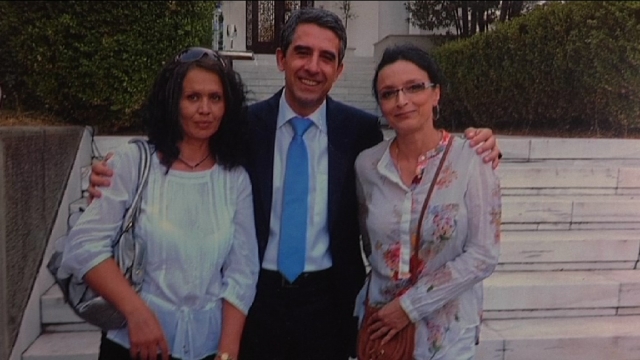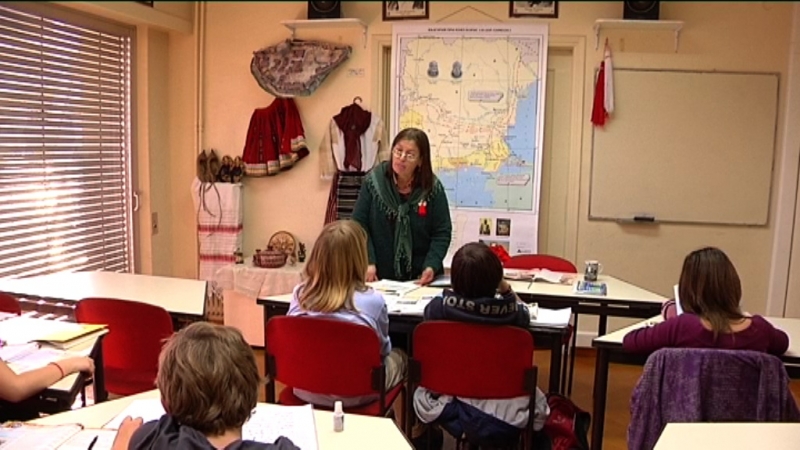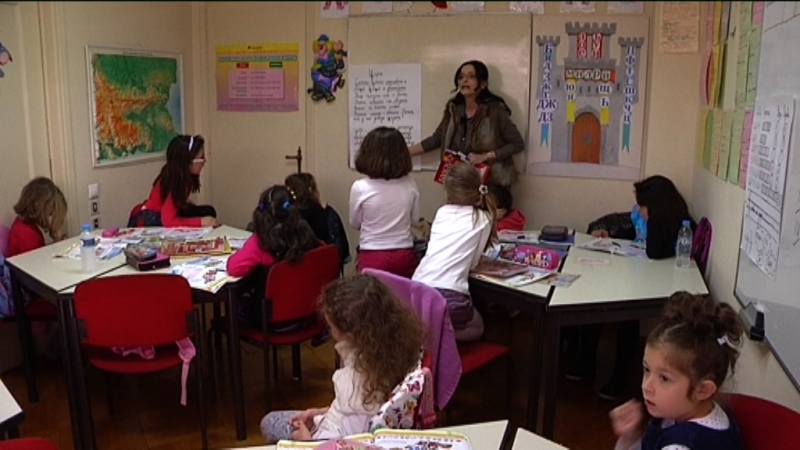Bulgarians in Greece, Cyril and Methodius, Day of Slavonic Alphabet
Victoria Mindova
On the day of Slavonic Literature and Culture, I started thinking what 24 May embodies for me. As a first reaction, invariably comes the thought of the creators of the Cyrillic alphabet. In my mind, Cyril and Methodius have an almost mythical character. They are canonised saints, their faces are painted on icons and their work has been living its own life for centuries.
Then I realised that, for me, the celebration of writing is represented by a particular person nowadays. This is a high school teacher of Bulgarian language and literature who inspired me to go deeper in the educational process, turned my apathy into curiosity and gave me the impetus to find my way in life. After eight years abroad, I came to the conclusion that knowing who you are and where you come from is one of the main conditions that help you develop in a foreign environment. We may often repeat that the role of teachers is very important, but we rarely realise it.
GRReporter contacted Mimi Nicheva (on the left in the picture) – a teacher of Bulgarian language and literature at the Bulgarian Sunday School “St. Cyril and Methodius” in Athens, so that she could share her thoughts on the holiday and tell us what it is like to be a teacher abroad.

24 May: the Day of Letters
“For me, the celebration of writing is one of the most genuine and pure holidays in Bulgaria. The work of Cyril and Methodius may have started in Great Moravia, but it finds its zenith in our land. Bulgaria is the true home of the Cyrillic alphabet, because the spread of literature and culture to other Slavic peoples started there. Therefore, we should be proud and continue writing in the Cyrillic alphabet,” said the teacher.
We asked her to tell us how Bulgarian teachers abroad have managed to maintain the flame of Bulgarian culture and what it takes to keep fighting. She teaches mainly young people from 14 to 18 years old, but also a group of children of a younger age. They study Bulgarian as a foreign language. Most often, they are from intermarriages and do not understand Bulgarian or understand it very little, but cannot communicate fluently in their mother tongue.
Bulgarian children in Greece
“I admire these children who not only go to a Greek school during the week, but come to learn about Bulgaria, its history and culture on Saturdays and Sundays. Children who come to us want to learn how to write and speak correctly. This is marvellous. They are strongly interested in their development. In

some cases, younger children come to the Bulgarian school because Mum and Dad insisted. This does not apply to older students. Students come to school on their own because they want to develop their knowledge and feel the need to get to know themselves and their roots. Younger students have a different motivation – they visit Bulgaria in the summer and want to understand and be understood.”
Favourite authors
Mrs Nicheva said that children at the Bulgarian Sunday School comprehend narrative literature best. They like works by Elin Pelin, Jovkov, Dimitar Talev, Dimitar Dimov. “In the beginning, they may be shocked by the amount that has to be read, but once the narrative starts, they become engrossed in the stories. Finally, they come and say, “Mrs Nicheva, but it was very interesting!”, she explained laughing. She added that Bulgarian literature is taught along with lessons in history, arousing the students’ interest and curiosity.
Poetry and especially symbolism are not so easily understood. “This is absolutely normal for children who have been completely detached from the Bulgarian reality. Old Bulgarian literature is also a little bit more difficult for them, mainly because of its liturgical nature,” said Nicheva.
Vazov forever
We asked Mrs Nicheva which authors or works must be known. “Ivan Vazov is the author that each Bulgarian should know. His work can be used as a tool of national and moral education. His love for Bulgaria is prevalent in his works.” She stressed that authors like Hristo Botev, Jordan Jovkov, Elin Pelin, Iavorov and others, should not be passed by in any case, but Vazov is the beginning.

Successes
Some of the students who graduate from the school maintain contacts with their teachers in Athens. Most of them start from the tenth grade, since they want to prepare for university exams in Bulgaria. “There are three girls, our graduates, who are now students in Bulgarian universities and who were my students,” said the proud teacher. Regarding motivation as a whole, she explained: “Children should have a desire to learn. We must comply both with the capabilities and capacities of the children and their parents’ willingness to support them. At school, we teach, but work at home is also needed.”
The Bulgarian Sunday School
The school provides a certificate which, together with the Greek high school diploma, guarantees that the student will be able to enrol in Bulgarian schools without taking additional exams, in case their family returns to Bulgaria. Sometimes, for financial reasons, parents have to leave the country with their children and change their environment. The opportunity to enrol in a normal Bulgarian school without additional problems is very important. “Visiting our school provides knowledge not only in Bulgarian history, language, geography and literature, but it also helps children integrate more easily when they return to Bulgaria.” There are additional seminars in mathematics and physics in Greek, which help Bulgarian children in their programme in Greek schools.
Modern writers of the Bulgarian national revival
Mimi Nicheva wanted to express her great gratitude to director Daniela Todorova and other teachers and supporters of the Bulgarian Sunday School “St. Cyril and Methodius”. She emphasised that thanks to her dedication to the Bulgarian national revival, Todorova has given impetus to the project. “In the beginning, there were only two teachers and five children in one room. Now, we have more than 200 students and interest is growing each year. Daniela Todorova is the one who has devoted herself completely and lives with the idea of the Bulgarian school. She managed to gather together a teachers’ team that was inspired by her enthusiasm.” Another friend of the project is George Karaindros. He helps the team and does everything possible in order to expand the school. “From administrative to technical problems - he is constantly supporting us, although he is a Greek,” she stressed.
A monument of Cyril and Methodius
About a month ago, the Bulgarian Sunday School started a petition for the erection of a monument of Cyril and Methodius in Greece. “So far, we have collected over a thousand signatures, but we need more support. According to proposals, it should be built either in Athens or in Thessaloniki. For us, it is not important where the monument will be erected, it is important to pay homage to the two brothers,” said the teacher. The goal is to collect as many signatures as possible for the petition by September this year, so that it may be submitted to the Bulgarian and Greek authorities and the process can start.